 Africans in Guangzhou
Africans in Guangzhou
 Pole dancer shows strength and beauty up in the air
Pole dancer shows strength and beauty up in the air
 College girls call for protection of ecological space on earth
College girls call for protection of ecological space on earth
 Top 10 celebrities driving auto brands
Top 10 celebrities driving auto brands
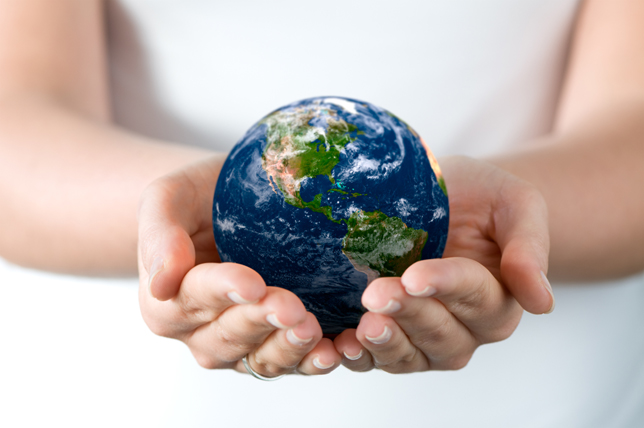 10 low-carbon tips to save money
10 low-carbon tips to save money
 Luxury cars make Asia premiere at Auto China
Luxury cars make Asia premiere at Auto China
 Versatile dog
Versatile dog
 Ni Ni covers BAZAAR JEWELRY
Ni Ni covers BAZAAR JEWELRY
 Cherry blossoms reach peak bloom in Washington D.C.
Cherry blossoms reach peak bloom in Washington D.C.
 Top Chinese fashion icons in foreigners' eyes
Top Chinese fashion icons in foreigners' eyes
The U.S.-Japan alliance targeted at China has been strengthened during US President Barack Obama's visit to Japan.
In a written interview with the Yomiuri Shimbun, Obama stated that the so-called "Senkakus" have been historically administered by Japan and fall under Article 5 of the Japan-US Security Treaty. "I commend Prime Minister Abe for his efforts to strengthen Japan's defense forces and to deepen the coordination between our militaries, including by reviewing existing limits on the exercise of collective self-defense." This is the first time that an incumbent US president has made such statements.
Obama added that US engagement with China "does not and will not be at the expense of Japan or any other ally". He also requested Japan's Self-Defense Forces "do more within the framework of our alliance". Undoubtedly, the US is easing limits on Japan so that it can play a bigger role in constraining China, especially military roles.
A related issue is that Japan's Internal Affairs and Communications Minister and about 150 Japanese lawmakers visited the Yasukuni war Shrine just a day before Obama's visit. As we know, the US had expressed "disappointment" over Japanese Prime Minister Shinzo Abe's Yasukuni shrine visit last December. The "disappointment" came after condemnations from China and South Korea, which damaged the trilateral relationship between the US, Japan and South Korea.
It is now clear that the American "disappointment" was not prompted by any kind of genuine concern for this Japanese historical revisionism. The danger of this development in US-Japan relations lies in the possiblity of America's encouragement of Japan's rightward political shift in an effort to constrain China's development.
America's pursuit of its own private interests at the expense of postwar peace is encouraging Japan's excesses. Is America not concerned about bringing troubles on itself? Of course not. Since the end of World War II, the US has maintained a military occupation of Japan, guaranteeing US control over the country. The incitement of Japanese actions against China is intended to constrain China and at the same time keep Japan in check, thus increasing its reliance on the US.
The US and Japan do have a divergence of views, but not on the Yasukuni Shrine visit nor on the rightward political shift. The issue concerns Japan's pursuit of independence. The Japanese government lobbied hard to get the White House to agree on an official state visit, but Obama refused to stay at the guesthouse during his visit, which is the standard practice during state visits to Japan. Japan knows that if it does not perform in constraining China, it will gain no prestige with the America. Japan remains an American puppet.
The US and Japan are playing with fire in Asia. But the story is much more complicated, given China's situation.
When asked if the U.S. would really use military force if the Chinese took action on the Diaoyu Islands. Mr. Obama said that the U.S.-Japan treaty was established before he was born, and is not subject to his interpretation. But he also said it would be a "profound mistake" to see continued escalation around this issue.
These words reflect Obama's unease. As he said, the interests of the two countries are closely intertwined. China is not only a major power in Asia, but also in the world as a whole.
The US and Japan, both with profound interests in the Asia-Pacific region, will benefit nothing from stirring up trouble here.
The article is edited and translated from 《美日在玩火 且玩且忐忑》, Source: People's Daily Overseas Edition, Author: Ren Weidong
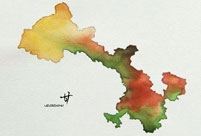 Hand-painted maps go viral online; painter's name remains unknown
Hand-painted maps go viral online; painter's name remains unknown 4th Beijing Int'l Film Festival ends
4th Beijing Int'l Film Festival ends Commando elite specializes in sign language
Commando elite specializes in sign language Man photoshops himself into girlfriend's childhood photos
Man photoshops himself into girlfriend's childhood photos Photo story: Stallholders at Beijing Zoo Wholesale Market
Photo story: Stallholders at Beijing Zoo Wholesale Market Artists on backstage
Artists on backstage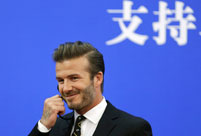 Beckham launches fund to support youth soccer in China
Beckham launches fund to support youth soccer in China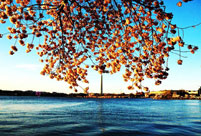 Cherry blossoms hit peak bloom in Washington D.C.
Cherry blossoms hit peak bloom in Washington D.C.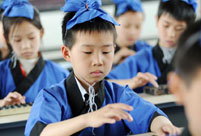 Children in ancient costumes learn Zhusuan
Children in ancient costumes learn Zhusuan Cute Shaolin boy melts the hearts of millions
Cute Shaolin boy melts the hearts of millions Giant panda Sijia is back to happy life
Giant panda Sijia is back to happy life Richest Chinese of 2014: half from the mainland
Richest Chinese of 2014: half from the mainland Chengdu - laid-back lifestyle makes happiest city
Chengdu - laid-back lifestyle makes happiest city The backstage of the Fashion Week
The backstage of the Fashion Week College students in Han costumes
College students in Han costumesDay|Week|Month